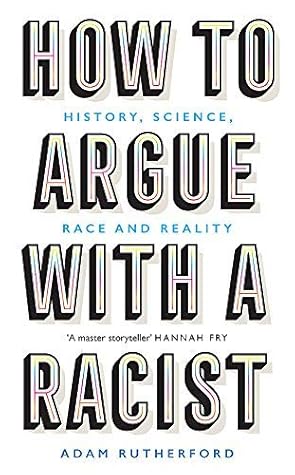More on this book
Community
Kindle Notes & Highlights
Read between
August 27 - September 8, 2024
It is often easier to make a claim than to refute it, but as racism is being expressed in public more openly today, it is our duty to contest it with facts and nuance, especially if bigotry claims science as its ally.
Race is a very poorly defined term. Since the seventeenth century, attempts to categorise people into racial types has resulted in the number of races being anywhere between one and sixty-three.
Almost 200 genes appear to have some influence over pigmentation in hair, which is about 1 per cent of the total number of genes in the human genome.
Humans suffer universally from a syndrome that Richard Dawkins called the ‘tyranny of the discontinuous mind’. We yearn to categorise things and fail to recognise continuity.
There is more genetic diversity in Africa than the rest of the world. What this means is that there are many more points of genetic difference between Africans, than between Africans and anyone else in the world – two San people from different tribes in southern Africa will be more different from each other in their genes than a Briton, a Sri Lankan and a Māori.
Racial purity is a pure fantasy. For humans, there are no purebloods, only mongrels enriched by the blood of multitudes.
‘Necessary but not sufficient’ is a phrase that geneticists like to use a lot. There is no reason to suppose that the variants of both ACE and ACTN3 that form part of the foundations of elite athletic ability are unique to Africa or recent African descent.
As ever, human genetics is as complex as human history, because human genetics is part of human history.
there is some genetic advantage in sporting achievement, some of which will manifest as physical traits that tilt the balance towards success. Precisely accounting for that genetic advantage is impossible, and none of it segregates with the colloquial races.
In comparing references to success by Black and White athletes, innate physical ability was typical in descriptions of Black athletes and intellectual prowess or industriousness was the most frequently referenced criteria for success in Whites.
As well as entertainment, sport is a celebration of the extremes of human capabilities. To reduce it to mere unearned biology is racism, whether conscious or not. In return for their pursuit of greatness, we owe elite athletes more deserving praise than auspicious ancestry.
Estimates vary depending on the study, but the proportion of cognitive abilities that can be attributed to genetics rather than other things is somewhere between 40 per cent and 60 per cent.
It might seem odd that a geneticist should want to downplay the significance of genes, but the fact is that we are social beings who have offloaded so much of our behaviour from our bodily hardware to our cultural software, and nowhere is this more apparent than in our intelligence.
Race is a social construct. This does not mean it is invalid or unimportant. Humans are social animals, and the way we perceive each other is of paramount importance. But it does mean that the colloquial use of race is a taxonomy that is not supported by our understanding of fundamental biology, meaning genetics and evolution.
Science is a quintessentially revolutionary process, perpetually trying to overthrow what has come before. But it’s also a deeply conservative revolution, meaning that it inches along, chipping away at the current state of knowledge.


